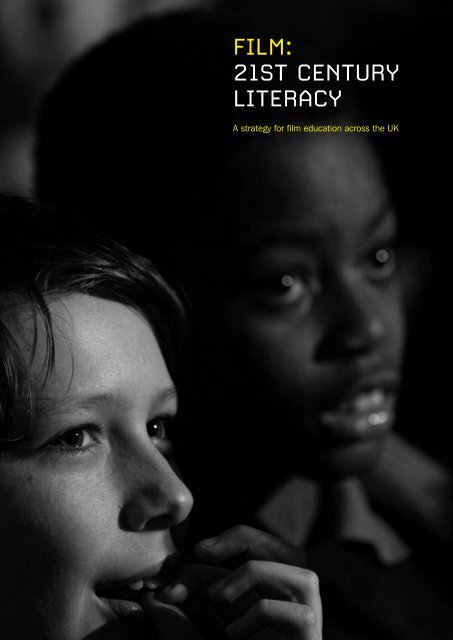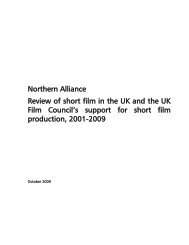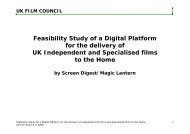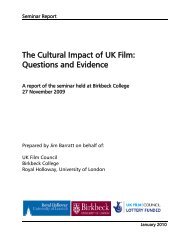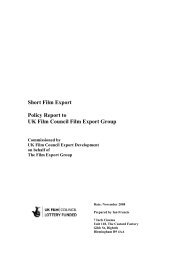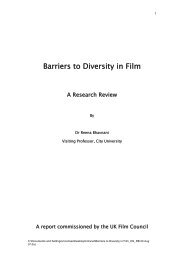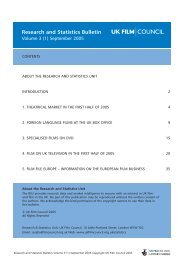FILM: 21ST CENTURY LITERACY - BFI
FILM: 21ST CENTURY LITERACY - BFI
FILM: 21ST CENTURY LITERACY - BFI
Create successful ePaper yourself
Turn your PDF publications into a flip-book with our unique Google optimized e-Paper software.
<strong>FILM</strong>:<br />
<strong>21ST</strong> <strong>CENTURY</strong><br />
<strong>LITERACY</strong><br />
A strategy for film education across the UK
“WHEN I FIRST SAW<br />
‘THE WIZARD OF OZ’ IT MADE<br />
A WRITER OUT OF ME.”<br />
SALMAN RUSHDIE
We live in a world of moving<br />
images. To participate fully<br />
in our society and its culture<br />
means to be as confident in<br />
the use and understanding of<br />
moving images as of the<br />
printed word. Both are<br />
essential aspects of literacy<br />
in the twenty-first century.<br />
Greg Dyke, <strong>BFI</strong><br />
Barbara Broccoli OBE, First Light Movies<br />
Foreword<br />
From the Chairs of <strong>BFI</strong>, Film Club,<br />
Film Education, First Light Movies,<br />
UK Film Council and Skillset<br />
In the same way that we take for granted that society has a responsibility<br />
to help children to read and write – to use and enjoy words – we should take<br />
it for granted that we help children and young people to use, enjoy and<br />
understand moving images; not just to be technically capable but to be<br />
culturally literate too.<br />
Britain already has what are probably some of the best film education<br />
initiatives in the world. However, for most young people, if they experience<br />
film education at all it is as isolated episodes that lack coherence and<br />
consistency. We want to move film education on from being a series of<br />
disconnected experiences to becoming an integral part of every young<br />
person’s life – a systematic process in which confidence and articulacy grow<br />
by having the opportunity to see a wide range of films, to gain a critical<br />
understanding of film and to enjoy the creative activity of filmmaking. The<br />
strategy set out in this document is a first step on the road.<br />
We want to build a wide and growing partnership with others, working formally<br />
within the education system and informally outside it; linking with the film<br />
industry and other cultural partners. Initially we have young people as our<br />
focus but with a longer-term ambition to reach anyone and everyone. We want<br />
a society where a dynamic film and moving image culture is part of every<br />
citizen’s enjoyment. We won’t achieve that in five years or ten years, but if we<br />
start now, we may do it in a generation.<br />
Sir Michael Bichard, Film Club<br />
Stewart Till CBE, UK Film Council<br />
Barry Jenkins OBE, Film Education<br />
Clive Jones CBE, Skillset
What is<br />
film education?<br />
Film education is making film more accessible to children and<br />
young people for their enjoyment, as a means of understanding<br />
the world and as a medium of self-expression.<br />
Film education:<br />
Provides children and young people with opportunities<br />
to watch a wide range of film - in cinemas, schools and<br />
elsewhere, using new technologies and platforms;<br />
Encourages learning, critical understanding, debate and<br />
conversation about films and the issues and emotions<br />
they raise;<br />
Enables children and young people to use film as a vehicle<br />
for their own creativity, and encourages the film industry to<br />
respect their voices.
What children and young people and their teachers<br />
say about film education:<br />
“Teachers have seen how, starting with film, all children<br />
regardless of ability, have been able to discuss narrative<br />
in a sophisticated manner. The use of film has allowed<br />
children to learn using a medium with which they feel<br />
comfortable and able to take risks. This allows for higher<br />
order thinking to take place which is then transferable,<br />
as well as giving them the tools to understand the mediarich<br />
world around them.”<br />
Literacy Adviser, West Midlands<br />
“Patience – you need a lot of patience! You need leadership<br />
skills too because if you’re directing you’ve got to tell<br />
people what to do… you’ve got to be able to take directions<br />
as well, and criticism, that’s an important one.”<br />
Teenager working on their own film<br />
“An amazing piece of work, magnificently directed, by<br />
far the best drama that I have seen in some time. The<br />
shockingly violent scenes force you to wonder how mankind<br />
can act as such savages; killing each other due to mere<br />
identity and belief. Are we humans really so great when<br />
there are still such atrocities occurring in today's world?”<br />
15 year-old student on Hotel Rwanda<br />
“This film is very sad in crying terms because even though<br />
it is animated, when a rabbit dies or is killed or even<br />
wounded it is so real you feel like it’s real life. This can<br />
teach us a lot about life in this world, both nice and nasty.”<br />
10 year-old pupil on Watership Down<br />
“I usually do not like films where you have to read subtitles.<br />
However I think Tsotsi changed my mind completely. After a<br />
while I forgot I was reading the subtitles and got hooked in<br />
the story. It was moving, watching how people in the third<br />
world lived. I thought the acting and the scenery was good,<br />
and the film got me intrigued. A good film.”<br />
15 year-old student<br />
“I’ve gained enormously from the opportunities to refresh<br />
my thinking on ways in which we can use technology to<br />
create visual meaning.”<br />
Teacher, after a Continuing Professional Development<br />
(CPD) session<br />
“This sort of thing doesn’t really happen to our sort, if<br />
you know what I mean, foster children, ‘cause they’re kind<br />
of, not put down but sometimes not given a chance and<br />
it’s nice just to have this opportunity to sort of... it’s just<br />
amazing.”<br />
Young award winning filmmaker<br />
“These screenings give our students a chance to identify<br />
vicariously with people that they might never sympathise<br />
with otherwise.”<br />
Head of Film Studies Department on the importance<br />
of cinema screenings for students
Film is an essential and much-loved<br />
part of the UK’s cultural heritage and<br />
one of the most widely enjoyed and<br />
accessible forms of entertainment and<br />
artistic expression in almost every<br />
country of the world. Part of its power<br />
lies in the way it has interacted with<br />
and driven the creative evolution of<br />
other long-established art forms<br />
including storytelling, music and the<br />
visual arts. It has extended its reach<br />
from the conventional cinema screen<br />
to a myriad of different platforms yet,<br />
whatever the technology, the end<br />
product remains the same – stories<br />
told using sound and light that move<br />
across a screen.<br />
What is remarkable is that, despite<br />
these changes, cinema is still a<br />
central driving force and cinema stars<br />
command global recognition as never<br />
before. But the significance of audiovisual<br />
media is changing profoundly; it<br />
has grown from being a vehicle for art<br />
and entertainment to become a core<br />
part of how we communicate and do<br />
business. We live in an age when to<br />
be literate means to be as familiar<br />
with images on a screen as with text<br />
on a page and to be as confident with<br />
a camera or a keyboard as with a pen.<br />
Literacy in the moving image has<br />
become an integral part of a wider<br />
literacy for the twenty-first century;<br />
children and young people need both<br />
to participate fully in society.<br />
Introduction<br />
Film inspires, excites, informs and moves. It has often been<br />
described as the great art form of the twentieth century;<br />
and it has certainly been one of the most popular.<br />
All this is widely acknowledged and yet<br />
media literacy and, more particularly,<br />
film education are still on the margins<br />
of national and international policy<br />
agendas. By ‘film education’ we mean<br />
providing children and young people<br />
with a structured, systematic opportunity<br />
to watch films, to understand<br />
films and even to make films as part<br />
of their overall preparation for adult<br />
life. In the UK we are lucky enough to<br />
have some of the best and most<br />
imaginative film education initiatives in<br />
the world, as well as a Charter for<br />
Media Literacy, drawn up by the UK<br />
Film Council and the main broadcasters,<br />
which has been adopted by<br />
government and is already being used<br />
as the template for action at a<br />
European level. However despite this<br />
leadership position, film education in<br />
the UK remains disconnected and<br />
inconsistent – a bonus for some lucky<br />
children and young people rather than<br />
an opportunity and entitlement for all.<br />
This document is intended as a first<br />
step on the road to changing that<br />
state of affairs. The organisations and<br />
agencies that have contributed to it<br />
represent a broad partnership and<br />
want to see the partnership grow<br />
further. For reasons of equity, and<br />
practicality, we have chosen to focus<br />
on children and young people under<br />
19 years of age in our first phase but<br />
the informed enjoyment of a wide<br />
range of film should be the right and<br />
expectation of everyone. We believe<br />
that what we map out here can make<br />
a positive and practical contribution to<br />
the ‘youth cultural offer’ the government<br />
proposes to make as part of<br />
every child and young person’s<br />
educational experience in England<br />
and strengthen educational developments<br />
in Scotland, Wales and<br />
Northern Ireland.<br />
Nor are we talking about yet another<br />
new initiative to be squeezed into an<br />
over-stuffed school curriculum: what<br />
we propose will make the existing<br />
curriculum more relevant and<br />
engaging, and is based on what is<br />
already happening in classrooms,<br />
after school or outside school<br />
altogether.<br />
Our agenda goes well beyond the<br />
playground walls. There is widespread<br />
concern about the lack of high-quality<br />
film and television content for children<br />
and young people. But the solutions<br />
suggested in Parliament, the media<br />
and elsewhere are usually posed on<br />
the supply side of the debate. We<br />
start from the other side – demand –<br />
believing that the most effective way<br />
to extend what the industry offers is to<br />
help nurture a more demanding and<br />
discriminating audience.<br />
We want to see the evolution of a<br />
popular and dynamic film culture in<br />
the UK, building on the rich heritage<br />
of British and world cinema and<br />
contributing to an even richer future in<br />
the decades ahead. What we set out<br />
here are the important first steps of<br />
that longer journey.
WE LIVE IN AN AGE WHEN TO BE<br />
LITERATE MEANS TO BE AS FAMILIAR<br />
WITH IMAGES ON A SCREEN AS WITH<br />
TEXT ON A PAGE, AND TO BE AS<br />
CONFIDENT WITH A CAMERA OR A<br />
KEYBOARD AS WITH A PEN.
Film education: a snapshot<br />
The UK already has a variety of organisations working in<br />
the field of film education, most of them funded directly or<br />
indirectly by the UK Film Council and together spending<br />
around £12m a year. They include:<br />
The <strong>BFI</strong>, long-established as the main<br />
national agency for promoting the<br />
understanding and appreciation of film<br />
and television.<br />
Film Club, piloted in 2007, which<br />
aims to establish a network of 7,000<br />
after-school film clubs across the UK<br />
over the next three years to dramatically<br />
increase the opportunities for five<br />
to 18 year-olds to watch films.<br />
Film Education, funded by the film<br />
industry, which provides structured<br />
programmes for the teaching of film<br />
criticism and appreciation in more<br />
than 18,000 schools each year and<br />
offers professional development<br />
opportunities and resources for<br />
teachers.<br />
First Light Movies, funding and<br />
mentoring children and young people<br />
aged between five and 19 to make<br />
short digital films, and now working<br />
with about 2,000 children and young<br />
people each year.<br />
Three National Screen Agencies,<br />
which promote the culture and<br />
industry of film and TV in Scotland,<br />
Wales and Northern Ireland.<br />
Nine Regional Screen Agencies<br />
in England, development agencies<br />
charged with building sustainable<br />
media sectors and encouraging<br />
greater public access to film culture.<br />
Skillset, the Sector Skills Council<br />
(SSC) for Creative Media, is a UK-wide<br />
industry body which supports skills,<br />
training and development for people<br />
and businesses to ensure the UK<br />
creative media industries maintain<br />
their world class position. Its<br />
key roles in relation to this strategy<br />
are in supporting continuing<br />
professional development, and in<br />
managing the implementation of the<br />
Diploma in Creative and Media.
There are many other providers of<br />
film education activity including<br />
schools, higher and further education<br />
insti-tutions, youth workers, community<br />
centres, broadcasters, film<br />
festivals, independent filmmakers,<br />
cinemas and mixed arts venues and<br />
local authorities.<br />
The list is impressive and the<br />
diversity and quality of much of<br />
the activity even more so. But the<br />
provision is uncoordinated and<br />
inconsistent. At the outset of this<br />
process an analysis was carried out<br />
of activity funded directly and<br />
indirectly by the UK Film Council,<br />
National Screen Agencies and other<br />
public bodies, which highlighted<br />
some of these discrepancies.<br />
The largest share of funding aimed<br />
at young people goes to 14-19 year<br />
olds and two-thirds of that is to<br />
support creative activity, in other<br />
words, the making of films rather than<br />
watching them or developing a critical<br />
appreciation. Barely 10% of all<br />
spending goes to the promotion of<br />
critical understanding of film in<br />
younger children (aged three to 14).<br />
And the reach, even of UK-wide<br />
organisations such as First Light<br />
Movies, is modest; with a budget of<br />
just over £1 million a year, First Light<br />
Movies has worked with 12,000<br />
children and young people between<br />
ages five to 19 and funded more than<br />
900 films in seven years – an astonishing<br />
achievement but still only<br />
reaching a tiny proportion of that<br />
overall age cohort.<br />
One of the priorities for film education<br />
is to integrate these strands so that<br />
children and young people have the<br />
chance to watch, to understand and,<br />
if they want, to make film – each<br />
element informing and reinforcing the<br />
impact and value of the others. We<br />
explore this more fully within this<br />
document. When resources are<br />
inevitably limited, we feel it is<br />
especially important to deploy them<br />
in the most effective and equitable<br />
way possible.
Immediate challenges<br />
Film education is still on the<br />
margins<br />
Although all four nations of the UK<br />
have space for the study of film and<br />
the media as part of the curriculum<br />
for five to 14 year-olds, in practice<br />
very few children and young people<br />
benefit; fewer than one in ten of 14-<br />
19 year-olds, for example choose to<br />
specialise in the study of film or<br />
media. Many of the shortcomings of<br />
present practice stem from the fact<br />
that, despite the National Curriculum<br />
in England and Wales, and positive<br />
curricular developments and the<br />
introduction of new curricula in<br />
Northern Ireland and Scotland, there<br />
is no embedded culture of entitlement<br />
for children and young people to<br />
learn about film as part of their overall<br />
educational experience. The growing<br />
emphasis given to creativity and<br />
culture within these curricula, and the<br />
proposed ‘youth cultural offer’ in<br />
England, may begin to shift this<br />
perception; part of our purpose in<br />
developing this strategy now is to<br />
ensure that film education, as a<br />
concept, is ready to play a significant<br />
and practical role in that process.<br />
There is little professional<br />
development for teachers and<br />
other educators<br />
A great deal of film education, in or<br />
out of the classroom, currently<br />
depends on the passion and commitment<br />
of individual teachers and other<br />
educators. However great their<br />
enthusiasm, teachers may feel that a<br />
lack of specialist expertise diminishes<br />
their professional confidence and<br />
therefore their ability to challenge<br />
and extend the learning experience<br />
of their students. There is a similar<br />
lack of systematic professional<br />
development for youth workers and<br />
media professionals who choose to<br />
work with children and young people<br />
on education-related projects whether<br />
in cinemas, production facilities or<br />
archives.<br />
There are no agreed teaching<br />
approaches for film education<br />
For the reasons suggested above,<br />
there is little emphasis on offering<br />
children and young people sustained,<br />
coherent programmes of learning<br />
with clear progression routes, and<br />
no systematic means of using film<br />
education to explore other, related<br />
topics such as intellectual property<br />
and respect for copyright. Often, film<br />
education is merely a disconnected<br />
series of one-off experiences;<br />
although there is a great deal of<br />
activity around the country, there is<br />
little shared understanding of what<br />
constitutes good practice or even<br />
good ideas in film education. As a<br />
consequence, there is a weak<br />
evidential base for understanding the<br />
impact or reach of film education and<br />
no agreed measures for evaluating<br />
its quality.<br />
Wider access to films<br />
A related issue is the increasing<br />
difficulty of getting access to a broad<br />
and varied range of films, especially<br />
for younger children. As cinemas and<br />
film distributors focus more and more<br />
on commercially attractive films, and<br />
as competition for audiences drives all<br />
but the most mainstream English-<br />
language films from network<br />
television, children and young people<br />
are unaware of the rich variety and<br />
extraordinary wealth of the UK’s film<br />
heritage, even though we have the<br />
most extensive film and television<br />
archives in the world. Nor are most<br />
children and young people aware of<br />
the enormous wealth of films from<br />
other countries and in other<br />
languages, despite living in one of<br />
the most culturally diverse nations<br />
on earth.<br />
At the same time, digital screenbased<br />
technologies are opening up<br />
great new possibilities for film<br />
education, as they are in every other<br />
area of learning, with online access<br />
to resources, the opportunity for<br />
personalised interactive learning,<br />
much cheaper and more accessible<br />
distribution of classic and contemporary<br />
cinema and relatively<br />
inexpensive and simpler production<br />
equipment allowing creative activity<br />
of a sort previously unimaginable.<br />
However, a number of recent<br />
government initiatives have begun<br />
to change the possibilities for film<br />
education:<br />
Extended days and communityfocused<br />
schools<br />
From 2008, many children and young<br />
people will be under the care and<br />
supervision of schools for more hours<br />
in the day and will have access to a<br />
wider range of non-formal educational<br />
opportunities, including the proposals<br />
for the ‘Find Your Talent’ cultural offer
programme which the Government<br />
has set out for young people in<br />
England. Film is a cost-effective,<br />
high quality and practical way of<br />
delivering some of the objectives for<br />
extended day provision for schools,<br />
children and young people.<br />
New accreditation pathways<br />
These include the Creative & Media<br />
Diploma, the Welsh Baccalaureate<br />
(BAC), Moving Image Arts and Youth<br />
Arts Awards. Each of these new forms<br />
of accreditation will offer opportunities<br />
for an expanded and more diverse<br />
experience of film. For the Creative &<br />
Media Diploma this will include workbased<br />
learning experiences. The<br />
Welsh BAC and Northern Ireland’s<br />
Moving Image Arts awards encourage<br />
new approaches to critical and creative<br />
film work, while the Arts Award<br />
has the scope to accredit children and<br />
young people for their work with film<br />
outside formal education.<br />
Personalised, structured and<br />
sustained learning opportunities<br />
The personalised learning agenda is<br />
being introduced in England as part of<br />
the Government’s Every Child Matters<br />
initiative, which set out five core<br />
themes for effective education –<br />
‘being healthy’, ‘staying safe’,<br />
‘enjoying and achieving’, ‘making a<br />
positive contribution’ and ‘economic<br />
well-being’. This has been enhanced<br />
by the recent 10 year Aiming High<br />
strategy to ensure children and young<br />
people gain comprehensive support<br />
from complementary activities inside<br />
and outside school to contribute to<br />
their learning and well-being.<br />
Film education has the capacity to<br />
contribute to each of these five core<br />
themes in community and school<br />
environments, and to their equivalents<br />
in Scotland, Wales and Northern<br />
Ireland, with digital technology<br />
allowing pupils to plan genuinely<br />
personalised learning pathways and<br />
structured and sustainable learning<br />
opportunities.<br />
Better access to archives<br />
The Government has recently committed<br />
an investment of £25 million<br />
towards a strategy for UK Screen<br />
Heritage. Together with £3 million<br />
already committed by the UK Film<br />
Council for the UK Digital Film Archive<br />
this fund will help secure the future of<br />
regional and national archives for the<br />
enjoyment of aud-iences across the<br />
UK. The strategy for UK Screen<br />
Heritage states ‘Media literacy and<br />
the use of moving images in<br />
education has a significant role to<br />
play in educating, both in formal and<br />
informal settings, a truly literate<br />
population.’<br />
Coupled with increased digital access<br />
in schools and elsewhere, these<br />
investments offer a major opportunity<br />
for rich educational development of<br />
screen archives.
Themes of the strategy<br />
Having set out the challenges and opportunities for film<br />
education in the UK, we outline here the ‘operating principles’<br />
for the strategy we propose to adopt.<br />
The Charter for Media Literacy<br />
was drawn up in 2005 by the UK Film<br />
Council and its partners on the Media<br />
Literacy Task Force, the BBC, Channel<br />
4 and Skillset. It suggested three ways<br />
in which a fully active and participating<br />
citizen would to be able to engage<br />
with media. Although film education<br />
has a specific emphasis different from<br />
a broader and all-inclusive approach<br />
to media literacy, the ‘three Cs’ of the<br />
Charter for Media Literacy underpin<br />
both.<br />
They are:<br />
Cultural Access<br />
The opportunity to choose from a<br />
broad range of films and so get a<br />
better understanding of our and other<br />
people’s culture, way of life and<br />
history.<br />
Critical Understanding<br />
The confidence to look behind the<br />
surface of the screen, to understand<br />
a film’s intentions, techniques and<br />
qualities.<br />
Creative Activity<br />
The opportunity to make film and<br />
moving image, to have some understanding<br />
of the technical and creative<br />
process that allows the effective<br />
expression of a story, a mood or an<br />
idea.<br />
In the same way that media literacy<br />
is not simply a matter of private<br />
benefit but an essential ingredient of<br />
the public good, so we believe that<br />
film education is not just about<br />
extending the private enjoyment and<br />
understanding of individuals, but has<br />
a clear public value, making a real<br />
contribution to our sense of cultural<br />
identity, emotional articulacy and to<br />
the UK’s future as an open, tolerant<br />
society built on the foundation of a<br />
knowledge economy.<br />
The ‘three Cs’ do not belong in<br />
isolation from each other but need to<br />
be brought together in an integrated<br />
approach to film education. Each<br />
element, while hugely beneficial in its<br />
own right, is made more valuable and<br />
more accessible by its integration with<br />
the other two. If children and young<br />
people are to get substantial benefit<br />
from film education they should<br />
experience all three areas and understand<br />
the relationship between them.<br />
In addition, we believe that there are<br />
four essential principles that give<br />
substance to this approach:<br />
Participation – everyone involved<br />
Film watching and filmmaking are<br />
both group activities. This collective<br />
experience of watching and making<br />
can bind together children and young<br />
people to give a sense of common<br />
purpose and community, qualities<br />
which we believe must be highlighted<br />
in all our future work.<br />
Progression – a learning journey<br />
We want to provide opportunities for<br />
children and young people to experience<br />
as wide a range of films as<br />
possible, to continually develop their<br />
critical and cultural understanding. In<br />
addition, we want to encourage an<br />
interest in, and engagement with,<br />
filmmaking.<br />
Evaluation – what works best?<br />
We want to develop a more systematic<br />
and integrated approach to film<br />
education. To support this, we want<br />
to disseminate good practice and<br />
develop first class teaching resources<br />
and learning tools. Most importantly,<br />
we wish to establish recognised and<br />
accepted common criteria for<br />
evaluating the impact and reach of<br />
our work.<br />
Professional development – how<br />
do we do it better?<br />
Linked to the identification and spread<br />
of good practice and recognised<br />
systems of evaluation, we will commit<br />
to improving and expanding professional<br />
development for teachers<br />
and for other related workers. We wish<br />
to explore the development of an<br />
approach which balances creativity,<br />
critical ability and craft when we are<br />
dealing with children and young<br />
people.<br />
We have now set out the challenges,<br />
opportunities and principles behind<br />
our thinking. In the next section we lay<br />
out what we are going to do.
Aims of the strategy<br />
Our vision is to ensure that all young people in the UK have the<br />
opportunity to learn about film in all its richness and creative<br />
possibilities. To achieve this, we have set ourselves two<br />
strategic aims, one structural, the other focusing on innovation.
Enhancing<br />
current activity<br />
We will consolidate existing<br />
film education activity into a<br />
coherent and unified approach<br />
that is advocated, communicated<br />
and evaluated.<br />
Ensure that the priorities of film<br />
organisations in the public sector are<br />
aligned with the principles of film<br />
education.<br />
Create a UK-wide network of key<br />
providers of film education to share<br />
best practice, promote knowledge<br />
and ideas, advocate and promote film<br />
education. The network will maintain<br />
an open access database of education<br />
providers throughout the UK.<br />
Additionally, a national conference will<br />
be organised for the network to meet<br />
and exchange ideas in early 2009 and<br />
will meet on a regular basis after that.<br />
Create new regional partnerships of<br />
film education providers that will<br />
enable significant new investment into<br />
film education.<br />
Innovative<br />
new activity<br />
To do this we will: To do this we will:<br />
To develop and sustain innovative activities for learning about<br />
film that ensure exciting opportunities are created for ever<br />
more diverse audiences. This will involve both filling important<br />
gaps in current provision and also initiating complementary<br />
activities that extend the range of film education into<br />
previously unexplored areas.<br />
Develop an infrastructure that<br />
enables children and young people to<br />
access a wider range of film content,<br />
in school, in cinemas and via other<br />
platforms.<br />
Invest in an expansion of online<br />
learning resources, especially those<br />
that introduce young people to the<br />
UK’s film archive heritage, and to new<br />
films made with public money in the<br />
UK.<br />
Establish a coherent and<br />
comprehensive programme of training<br />
and development for those involved in<br />
film education, accredited by Skillset<br />
and others. The programme will be<br />
managed through the regional and<br />
national partnerships, and there will<br />
be a national framework to ensure<br />
quality of provision.<br />
Use new learning routes as opportunities<br />
for expanding film education<br />
(including such pathways as Creative<br />
& Media Diploma, the Welsh BAC,<br />
Youth Arts Award, Moving Image Arts).<br />
Run regular advocacy campaigns<br />
aimed at employers, the film industry,<br />
general public, policy makers,<br />
broadcasters and education providers<br />
to persuade them of the value of film<br />
education. Such campaigns will be<br />
high impact and will start in 2008 with<br />
Film and Video Nation, a UK-wide<br />
initiative to promote participatory<br />
filmmaking around the Olympics.<br />
Work with all four UK Governments to<br />
incorporate film education in the<br />
curricula of their initial teacher<br />
education programmes.<br />
Long term success for this strategy will<br />
require sustained communication,<br />
regular monitoring, and credible<br />
evaluation of the outputs, public value<br />
and success of its various elements.<br />
The evidence base generated by all<br />
the partners will then be a key tool for<br />
advocacy across public, private<br />
sectors and Government.
What happens next?<br />
This strategy brings together the work of many organisations,<br />
all of us convinced that by working together in a more<br />
integrated way we can transform the impact and value of film<br />
education for children and young people in every part of the UK.<br />
In this first phase of the<br />
strategy, we propose to focus<br />
our energies on achieving five<br />
main tasks, which are:<br />
To devise and implement a professional<br />
development programme<br />
for teachers and other film<br />
education practitioners to raise<br />
standards of delivery and quality<br />
of engagement for children and<br />
young people.<br />
To develop online resources that<br />
give educational access to the<br />
UK’s film archives (in association<br />
with the UK Screen Heritage<br />
strategy).<br />
To create online resources to<br />
accompany every appropriate<br />
publicly funded British film.<br />
To build a UK-wide network of<br />
school-based film clubs.<br />
To pilot a new kind of partnership<br />
between the film and education<br />
sectors: one at a national level (in<br />
Wales) and three in English regions<br />
(in the East Midlands, Yorkshire<br />
and the North East). In the second<br />
and third years we will extend<br />
these pilot projects to encompass<br />
the other nations and regions.<br />
Our ambition to achieve genuinely<br />
UK-wide impact will be underpinned<br />
by a commitment to<br />
prioritise action in rural areas and<br />
places that do not have cinemas.<br />
This document grows out of the work<br />
of a wide-ranging Strategy Action<br />
Group, brought together under the<br />
auspices of the UK Film Council and<br />
consisting of representatives from the<br />
<strong>BFI</strong>, Film Education, Film Club, First<br />
Light Movies, Skillset and the national<br />
and regional Screen Agencies. We<br />
recognise that, as well as these<br />
organisations, many of which are<br />
funded directly or indirectly by the<br />
UKFC, there are many small<br />
community-based and locally funded<br />
organisations which are the life-blood<br />
of film education provision. Most<br />
significantly, the 35,000 primary and<br />
secondary schools and colleges in the<br />
UK are all our partners or potential<br />
partners. In going forward it is our<br />
intention to work with, and support<br />
the work of, as many of them as<br />
possible.<br />
Although the Action Group initially<br />
came together to provide a context<br />
for the drafting of this document, our<br />
expectation is that it will continue to<br />
meet on a quarterly basis to provide<br />
feedback and guidance as the strategy<br />
is implemented and developed.<br />
In addition, a smaller Leadership<br />
Group, consisting of representatives<br />
from the UK Film Council, the <strong>BFI</strong>,<br />
First Light Movies, Film Education and<br />
Film Club has been largely responsible<br />
for drafting this document and will<br />
continue to be responsible for coordinating<br />
the strategy.
Learning<br />
journeys<br />
What kinds of film experience<br />
do we want children to have?<br />
What might they get out of it?<br />
Tunde’s Journey<br />
Tunde is 16. His interest in film started at his after-school<br />
film club, then took him to his local cinema. He’s one of<br />
the programmers of the club, showing films every Friday,<br />
and inviting local filmmakers in for discussions and<br />
workshops. He writes about the films on his Bebo page.<br />
He’s seen two films this year that have impressed him:<br />
Night of the Hunter, and Show Me Love. Tunde’s school film<br />
club decided that they wanted to make their own film about<br />
feeling unsafe on some of the rural footpaths near where<br />
they live. They heard about Mediabox, which lets you bid for<br />
money to do your own media project, and applied for<br />
money to make it with their local cinema. They showed the<br />
film in their local cinema where they invited local councillors<br />
as well as friends and family and the council was impressed<br />
enough to improve the lighting and signage on the pathway<br />
– and then asked the film club to make a film about young<br />
people volunteering.<br />
What Tunde said:<br />
“Shooting was a little bit of what I expected. I had a vague<br />
idea of what it would be like but I'd never seen a documentary<br />
shot before, so I never imagined it would be quite<br />
as long. I thought... if it was a drama I expected more<br />
people but there was just one person most of the time –<br />
the subject – and we were talking to them constantly and<br />
then redoing it... I never thought you'd have to redo<br />
something in a documentary.”<br />
What Tunde’s dad said:<br />
“I don’t think our household has talked about anything else<br />
for the past six months.”<br />
What the Councillor said:<br />
“This was a thought-provoking film. The whole initiative<br />
shows what young people can do if given the chance. The<br />
making of the film is a valuable experience for the students<br />
and the wider community.”
Jenny’s Journey<br />
Jenny is 11. In History, she made a trailer showing what<br />
happened in England during WW2 using an online editing<br />
tool called E-SEQ which lets you choose clips of archive<br />
footage and put them together and a voice-over and add<br />
your own music. Jenny wasn’t keen on black and white<br />
films before but now thinks you can make them interesting<br />
if you add in your own stuff. She proudly showed her Nan<br />
the film and her Nan recounted stories about being a child<br />
during the war. Jenny’s Nan took the film to the Help the<br />
Aged Community centre and now Jenny’s school is working<br />
on a film reminiscence project where the children interview<br />
older people and add their voice-overs to archive films.<br />
Jenny sent the film to Film Street (First Light Movies’<br />
website for younger children that introduces them to filmmaking<br />
techniques) so other people could watch it and<br />
compare it with their own. Teachers from other schools<br />
have used the film in their own teaching. Now Jenny wants<br />
to make films so future generations will know about her, her<br />
life, and community.<br />
What Jenny said:<br />
“Film is a great way to bring people together; I never knew<br />
the older generation had such hard lives, or great stories.<br />
The best thing was that you were working with people both<br />
more and less experienced than yourself. Not only would<br />
you learn from people who had more teaching ability than<br />
you, but also from teaching things you knew to others.”<br />
What Jenny’s mum said:<br />
“Jenny’s film built a bridge with my mother’s generation.<br />
It’s really important that young people know that older<br />
people were young once.”<br />
What Jenny’s teacher said:<br />
“I’ve just been looking at their history exams and they’re<br />
very good. It’s helped them develop their knowledge so<br />
much more. In the class we can have debates about it<br />
because everybody’s got a view and they’re more willing<br />
to listen and to speak about it.”<br />
More Journeys<br />
Sarita loves film. She watches the latest trailers on Film<br />
Street, and her school took her to a children’s film festival<br />
where she saw a Moroccan film called Zaina Rider of the<br />
Atlas about a girl who wins a horse race, beating all the<br />
men in her tribe. The film prompted her to choose to do a<br />
school project about Morocco where she now has half a<br />
dozen e-pals. She asked for the film to be shown at her<br />
after-school film club and afterwards she got together four<br />
of her friends to make a 5-minute film about horse riding<br />
which they posted on YouTube for their friends in Morocco<br />
to watch. She’s heard that at secondary school there’s a<br />
film club, and she wants to get them to show more films<br />
like Zaina.<br />
Carl is 17 and has left school. His local youth club ran a<br />
project to make a documentary about their estate, and he<br />
wandered into the room where they were editing. After a bit<br />
of negotiating, they gave him a five-minute sequence to<br />
edit to sound and he thought it was a great way to control<br />
how people saw you, changing soundtracks to make the<br />
film more upbeat. He’s since heard about Mediabox and<br />
he wants to get his friends together to do a film challenge –<br />
making ten different music videos for a Sean Kingston song<br />
to put on YouTube.<br />
Charlie went to see a film in National Schools Film Week –<br />
they wanted to see Shrek, but they all agreed that as they’d<br />
seen it lots of times before they could just this once see<br />
something else. The film was called My Neighbour Totoro<br />
about a big cat that takes two little girls on adventures. He<br />
told his parents about it and they bought it in a box set of<br />
other films by the same director. He liked another one,<br />
Kiki’s Delivery Service, so he took it into school and they<br />
played it in golden time and talked about whether the witch<br />
was evil and nasty, or forced to do bad things.
UK partnerships model
Elements of film education
People who have been<br />
involved along the way<br />
Sara Clowes Northwest Vision & Media<br />
Carol Comley UK Film Council<br />
Sybil Crouch Ffilm Wales<br />
Scott Donaldson Scottish Screen<br />
Corinna Downing BAFTA<br />
Wendy Earle <strong>BFI</strong><br />
Pip Eldridge First Light Movies<br />
Karen Langston Skillset<br />
Clare Lewis First Light Movies<br />
Bill Lucas The Bill Lucas Partnership<br />
Bernard McCloskey Northern<br />
Ireland Screen<br />
Martin Melarkey The Nerve Centre, Derry<br />
Sarah-Jane Meredith South West Screen<br />
Heather Rabbatts UK Film Council<br />
Derek Ray-Hill Film Education<br />
Mark Reid <strong>BFI</strong><br />
Paul Richardson UK Film Council<br />
Trish Sheil MOVies<br />
Heather Stewart <strong>BFI</strong><br />
Dan Thomas Film Agency for Wales<br />
With thanks to<br />
Louise Anderson <strong>BFI</strong><br />
Jay Arnold Screen Yorkshire<br />
Martin Ayres Screen East<br />
Tom Barrance Media Education Wales<br />
Jim Barratt<br />
Jo Burns BOP Consulting<br />
Pauline Burt Film Agency for Wales<br />
Christine James <strong>BFI</strong><br />
Toby Jackson<br />
Andrew Gallagher Moving Image<br />
Education Project Leader<br />
Jenny Grahame English & Media Centre<br />
Rachel Grant UK Film Council<br />
Julie Green Film Education<br />
Clive Myer University of Glamorgan<br />
Caroline Nagle UK Film Council<br />
Amanda Nevil <strong>BFI</strong><br />
John Newbigin UK Film Council<br />
Caroline Norbury South West Screen<br />
Nicky North <strong>BFI</strong><br />
Claire O’Brien <strong>BFI</strong><br />
Anne Threlkeld UK Film Council<br />
Ana Tovey<br />
Sam Wainstein Film Club<br />
Nick Walker Film Education<br />
Geraldine Walker MOVies / Showroom<br />
Cinema<br />
Ian Wall Film Education<br />
Cary Bazalgette<br />
Pete Buckingham UK Film Council<br />
Tim Cagney UK Film Council<br />
Thalia Cassimatis <strong>BFI</strong><br />
Jo Cassey Skillset<br />
Chris Chandler<br />
Nikki Christie UK Film Council<br />
Paul Harris University of Abertay Dundee<br />
Clare Harwood <strong>BFI</strong><br />
Ken Hay Scottish Screen<br />
Antonia Hazlerigg UK Film Council<br />
Mark Higham Film Club<br />
Anneli Jones Arts Council Wales<br />
Alison Kirwan <strong>BFI</strong><br />
Kate O’Connor Skillset<br />
Peter Packer<br />
Becky Parry<br />
Lorna Partington<br />
Patrick Phillips Principal & Chief<br />
Examiner for A Level Film Studies<br />
Rebekah Polding Film London<br />
Gethin While Cardiff University<br />
Amanda White<br />
Richard Williams Northern Ireland Screen<br />
Debbie Williams EM Media<br />
John Woodward UK Film Council<br />
Adrian Wootton Film London<br />
Cover image courtesy MGM<br />
Graphic design by www.publicworks.org.uk
“Film is a great way to bring<br />
people together; the best thing<br />
is working with people both<br />
more and less experienced than<br />
yourself. Not only would you<br />
learn from people who had more<br />
teaching ability than you, but<br />
also from teaching things you<br />
knew to others.”<br />
Jenny,<br />
young filmmaker
Film: 21st Century Literacy<br />
A strategy for film education across the UK<br />
Film education means providing children and young<br />
people with a structured, systematic opportunity to watch<br />
films, to understand films and even to make films, as part<br />
of their overall preparation for adult life.<br />
In the UK we are lucky enough to have some of the best<br />
and most imaginative film education initiatives in the world,<br />
as well as a Charter for Media Literacy, drawn up by the UK<br />
Film Council and the main broadcasters, which has been<br />
adopted by Government and is already being used as the<br />
template for action at a European level. However despite<br />
this leadership position, film education in the UK remains<br />
disconnected and inconsistent – a bonus for some lucky<br />
children and young people rather than an opportunity and<br />
entitlement for all.<br />
This document is intended as a first step on the road to<br />
changing that state of affairs.<br />
Contact us<br />
Partnerships department<br />
UK Film Council<br />
10 Little Portland Street<br />
London<br />
W1W 7JG<br />
info@21stcenturyliteracy.org.uk<br />
www.21stcenturyliteracy.org.uk<br />
Please visit<br />
www.21stcenturyliteracy.org.uk<br />
to download a large print version<br />
of the strategy.


